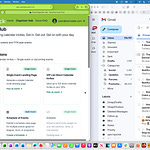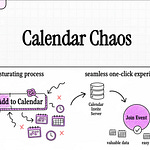Briefing Document: Notify Organizer of Failed Event Creation - Technical Overview
Date: October 26, 2023
Source: Excerpts from "Chapter 13 ‐ Notify Organizer of Failed Event Creation ‐ Technical Overview · calendarinvite/calendarinviteserver Wiki · GitHub"
I. Executive Summary
This document provides a technical overview of the "Notify Organizer of Failed Event Creation" function within the Calendar Invite Server (CIS). This function is designed to inform event organizers when an attempt to create an event has failed, enabling them to take corrective action and maintain awareness of unsuccessful submissions. While not critical to the core CIS functionality, it significantly enhances system transparency and user experience. The function leverages several AWS services, including Lambda, SES, SQS, and CodeCommit, to efficiently deliver these notifications.
II. Main Themes and Most Important Ideas/Facts
Purpose and Importance:
The primary goal of this function is to notify event organizers of failed attempts to create an event. This is crucial because it "allows organizers to take corrective action and ensures awareness of unsuccessful event submissions."
Although "not a critical component of CIS," it "enhances system transparency by providing actionable failure notifications." This suggests a focus on user experience and operational visibility.
AWS Services Utilized: The function is built upon a serverless and managed services architecture provided by AWS.
AWS Lambda: Serves as the compute engine, handling "event processing and notification dispatch."
Amazon SES (Simple Email Service): Employed for "Sends failure notifications to organizers." This indicates email as the primary notification channel.
Amazon SQS (Simple Queue Service): Used for "Manages failed event creation messages in the queue," ensuring message persistence and reliable processing.
AWS CodeCommit: Stores the "email notification template," centralizing template management and version control.
Functionality Breakdown - Event Processing Flow:
Trigger: The process is initiated by an "SQS event notification." This means a failed event creation message is first placed into an SQS queue, which then triggers the Lambda function.
Event Details Extraction: The function "Retrieves event details from the SQS message" and "Loads the email template from AWS CodeCommit."
Notification Dispatch: An email is "Sends an email via SES to notify the organizer."
Cleanup: "Deletes successfully processed messages from SQS" to prevent reprocessing.
Key Functions (Code-Level Overview): The document outlines specific functions involved in the process:
lambda_handler(event, *): The entry point for the Lambda function, it "Iterates through each record in the SQS event" and calls process_request_from.
process_request_from(record): The core logic function, it "Extracts event details," "Loads the email template," "Sends the email notification," and "Deletes the processed message from SQS."
get_event_notification_template(): Specifically responsible for "Retrieves the email template from AWS CodeCommit."
delete_successfully_processed_sqs(message): Ensures messages are removed "to prevent retries" after successful processing.
Data Handling - Email Notification Format:
Recipient: The notification is sent to "The email address of the event organizer (mailto field)."
Template: The content is driven by a "Template: Stored in AWS CodeCommit."
Subject/Sender: Defined by "SUBJECT environmental variable" and "SENDER environmental variable," respectively, allowing for dynamic configuration.
Environmental Variables: Crucial for Configuration and Operation.
REGION: AWS Region for execution.
SUBJECT: Subject line for the notification email.
SENDER: Sender email address.
FAILED_EVENT_NOTIFICATION_EMAIL: Path to the email template within CodeCommit.
CODECOMMIT_REPO: Name of the CodeCommit repository.
SQS_URL: URL of the SQS queue for failed event notifications.
Error Handling:
Failed Email Notifications: These are "Logged for troubleshooting, but failures do not impact CIS functionality." This implies a degree of fault tolerance within the notification mechanism itself, meaning that a notification failure will not disrupt the central event system.
Missing Email Templates: If a template is "unavailable, an error is logged and the message remains in SQS for retry." This is a critical detail, ensuring that event details aren't lost if the template cannot be retrieved, allowing for subsequent processing attempts.
Exception Logging: General error logging is in place "to facilitate debugging."
III. Conclusion
The "Notify Organizer of Failed Event Creation" function is a crucial supporting component of the Calendar Invite Server (CIS), designed to enhance user experience and system transparency. By leveraging a robust set of AWS services, it ensures reliable and configurable notifications to organizers regarding failed event submissions. Its error handling mechanisms, particularly the retry strategy for missing email templates, highlight a well-considered approach to maintain data integrity and system resilience.












